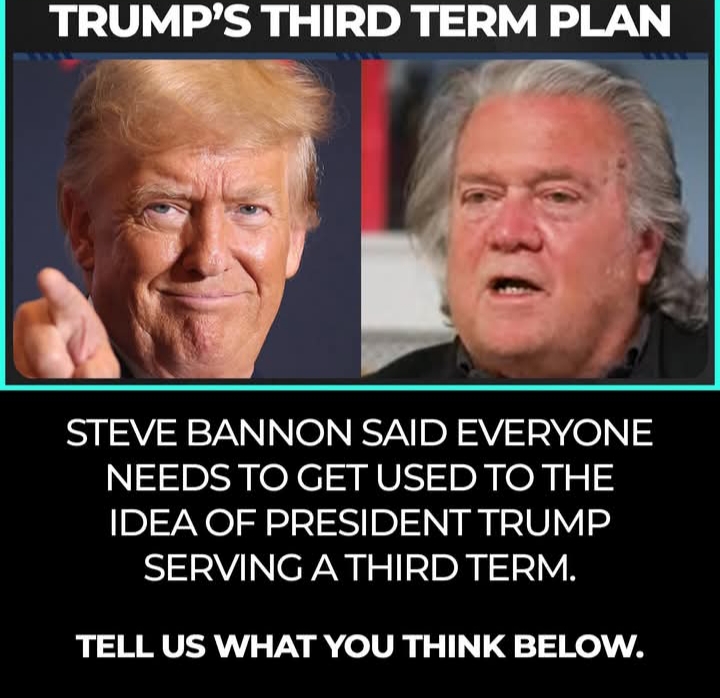NEWS
Steve Bannon: Trump’s Third Term WILL HAPPEN

Steve Bannon: Trump’s Third Term WILL HAPPEN
## “Steve Bannon: ‘Donald Trump’s Third Term Will Happen’
In a recent interview with *The Economist*, Steve Bannon, former adviser to Donald Trump and longstanding figure in the MAGA movement, declared with certainty that Trump will return to the White House in 2028 for a third presidential term. ([People.com][1])
### What Bannon is saying
* Bannon affirmed: *“He’s going to get a third term. Trump is going to be president in ’28.”* ([Newsmax][2])
* He claims the existence of “many different alternatives… we’ll lay out what the plan is” to get around the constitutional barrier imposed by the Twenty‑Second Amendment, which prohibits any person from being elected President more than twice. ([Newsweek][3])
* In his framing, Trump is cast as “an instrument of divine will” and someone the country “need[s] … for at least one more term.” ([mint][4])
* Bannon suggests that the odds for 2028 are better than 2016 or 2024: “We had longer odds in ’16 and longer odds in ’24 than we got in ’28.” ([Newsmax][2])
### The constitutional barrier
The main legal obstacle is the Twenty-Second Amendment, ratified in 1951, which states: “No person shall be elected to the office of the President more than twice.” ([The Guardian][5])
Legal scholars generally interpret this as preventing any person who has already been elected twice from being elected again, regardless of whether the terms were consecutive. ([PolitiFact][6])
### The proposed “workarounds”
Bannon and his allies are floating various alternatives (but with few specifics):
* One idea: Trump serves as VP in 2028 and then ascends to the presidency via resignation of the president. But this faces its own constitutional issues (especially the 12th Amendment). ([PolitiFact][6])
* Another approach: Amending or repealing the Twenty-Second Amendment. But this is a high bar: requires two-thirds of both houses of Congress and ratification by three-quarters of states. ([The Guardian][5])
* Bannon, in public remarks, simply says: *“There’s a plan… we’re working on five or six different alternatives.”* ([Newsweek][3])
### Why this matters
* **Institutional implications**: If a former president with two terms seeks a third, it directly challenges constitutional norms about term-limits and executive power.
* **Political signaling**: These statements serve to energize a segment of the base and keep Trump politically relevant, regardless of legal viability.
* **Democratic risk**: Critics argue that even if legal barriers remain, the rhetoric and planning around subverting constitutional limits raise broader concerns about respect for democratic institutions. ([World Socialist Web Site][7])
### How likely is it?
While Bannon’s confidence is high, the path to a third term appears extremely steep:
* The constitutional language is clear about the two-term limit. ([PolitiFact][6])
* Legal scholars are skeptical that any workaround would survive judicial review. ([The Guardian][5])
* Politically, passing a constitutional amendment is very difficult and would require broad bipartisan and state-level support.
* Trump’s age and health by 2029, as well as shifting Republican dynamics, add further uncertainty.
### In sum
Steve Bannon is making a bold claim: that Donald Trump will serve a third presidential term beginning in 2029 (following a 2028 election) by circumventing current constitutional limitations. The plan is purportedly in motion, though still neither detailed nor legally validated. Whether this becomes a serious political reality—or remains provocative rhetoric—will depend on the coming years’ legal, institutional, and electoral developments.
—
**Bottom line**: The idea of Trump’s third term is no longer purely hypothetical in his inner circle; it’s now being publicly declared and framed as achievable. But the legal and structural hurdles are formidable and, for now, unresolved.
Would you like a deeper dive into *what specific “alternatives” are being discussed*, or *how U.S. constitutional law views each of them*?












